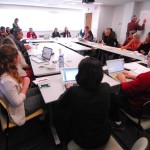
Ms. Kelly Olshan
Barriers to Arts Participation: On Perception, Value, and Luxury
Posted by Aug 23, 2014

Ms. Kelly Olshan
In America, the arts are often seen as a luxury. They are the first thing to go when school boards cut budgets, and successful arts policy is seen as the exception, not the rule.
Like other so-called “luxuries,” people go to extreme measures to preserve its integrity. Historically, art is something we risk incarceration for, accept poverty for, or in the case of the quintessential rock star—quit your job, sell your house, and move across the country. Chuck Close said art saved his life. Ai WeiWei has been detained by the Chinese government. Thrice. Clearly, we’re onto a powerful motivating force.
Yet if so many acknowledge the arts’ value, then why do we even have to convince people to participate? Americans for the Arts' CEO Bob Lynch traces Americans’ view of cultural events to our puritanical roots: “In Europe, arts advocacy organizations don’t exist they way they do in America—simply because they don’t need them.”
Read More













